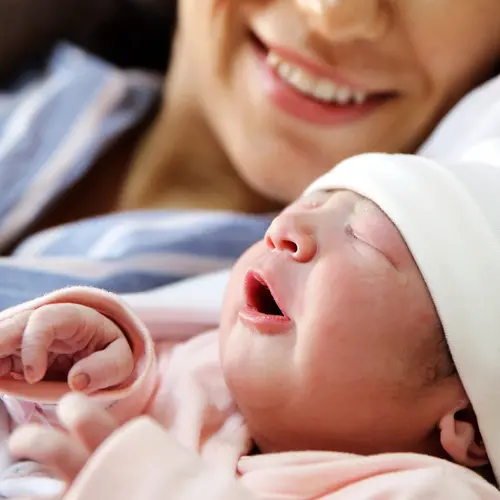Your first period after pregnancy is also called a postpartum period. When it occurs depends on whether or not you breastfeed. Your menstrual cycle may be different after you have your baby.
What to Expect With Your Period After Pregnancy
When will you get your period after pregnancy? Parents who breastfeed all the time usually don't get their period again until they stop nursing. They may also get their periods if they stop nursing partially, especially at night. Parents who bottle-feed, or do a combination of breastfeeding and bottle feeding, may get their periods as soon as five weeks after giving birth.
When you breastfeed full-time, your body produces more prolactin — the hormone that helps you produce milk for your baby. That hormone also stops your period from coming.
According to one study, over two-thirds of parents who don't breastfeed get their first period after pregnancy within 12 weeks of giving birth. Only around one-fifth of breastfeeding parents will get their period within six months of giving birth. If you are a breastfeeding parent, your menstrual cycle will return within one to two months after you stop nursing your child or start significantly reducing the amount you nurse.
Post-birth bleeding. Whether you had a C-section or delivered vaginally, you will have bleeding for six to eight weeks after giving birth. However, this is not considered menstruation. It is called lochia.
In the beginning, your lochia will be deep red, and you may pass a few blood clots. These clots may be as large as a plum. As the days pass, the discharge will become more watery and fade to pinkish or brownish. After a few weeks, the lochia is usually whitish or yellowish and may not be present every single day.
Parents experiencing lochia after giving birth should only use menstrual pads or maternity pads, not tampons. Nothing should enter the vagina within six weeks of giving birth.
You can still get pregnant. Even if you don't get your period after giving birth because you're breastfeeding, there's a small chance you can get pregnant because you might still ovulate during this time. The risk is between one and five percent. Consider which birth control methods you will use to manage this risk.
How your period changes after pregnancy. Once your period returns, it may be different than it was before. It may be heavier. You may have more or less cramping than you had before. Your periods may be irregular, especially if you are still breastfeeding sometimes. At first, you may have some more clotting in your periods than before. Experts recommend seeking medical advice if you have blood clots in your period for at least a week.
Some people find their periods get easier after pregnancy. This may be because the uterus has stretched out and relaxed. Others find they are more difficult, which may be due to the larger, stretched out uterus having more tissue to shed each cycle.
People with endometriosis often experience easier periods after pregnancy. However, this change is usually only temporary, and more painful periods come back after a few months.
Irregular periods. Just having one menstrual cycle after pregnancy does not mean your periods have returned. You may or may not have ovulated. You are more likely to ovulate if you have started to wean your child.
Does Your Period Affect Your Milk Supply?
Your menstrual cycle may affect your milk supply if you get your period. In the time between ovulation and when you get your period, your milk supply may be lower. Experts recommend adding calcium and magnesium to your diet to maintain a steady supply of breast milk throughout your whole cycle.
Having your period can also affect how your breast milk tastes. Your baby may be fussier during feedings while you're menstruating due to a change in taste.


